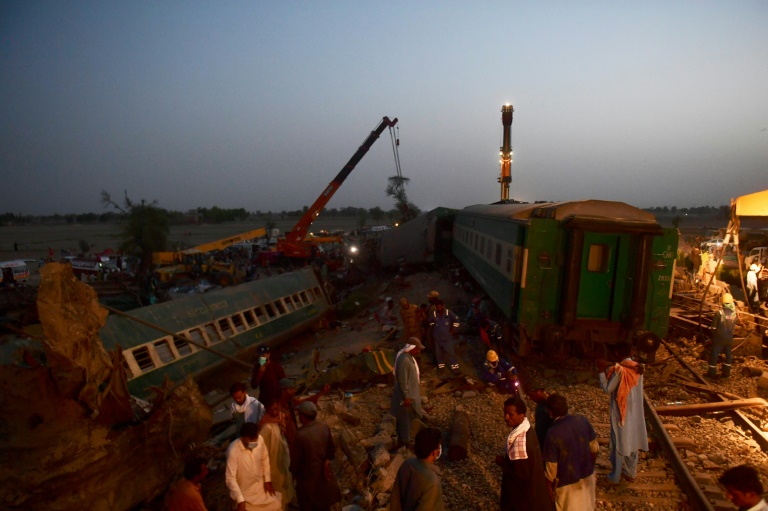Pakistani engineers re-opened the nation’s main north-south railway line Tuesday after clearing the mangled wreckage of two trains that collided in a remote farming region, killing dozens and highlighting huge safety problems on the dilapidated network.
At least 63 people died early Monday when a high-speed passenger train knifed through carriages of another express that had derailed minutes earlier near Daharki in Sindh province.
It took army and civil engineers a day and a half to clear the wreckage of carriages that were crushed or sliced open like tin cans.
A heavy stench of diesel, sweat and blood hung over the scene, with workers saying bodies were still being pulled overnight from mangled carriages.
“This is the most colossal accident I have seen in about 10 years of service,” railway engineer Jahan Zeb told AFP, his eyes puffy from sleeplessness.
The Millat Express was heading from Karachi to Sargodha when it derailed, its carriages strewn over the tracks as the Sir Syed Express from Rawalpindi arrived minutes later in the opposite direction, smashing into it.
The accident has reignited debate about the parlous state of Pakistan’s public transport system — particularly a rail network that has seen little investment in decades.
It is not known what caused the Millat Express to jump its tracks, but Interior Minister Sheikh Rashid — a former railways minister — described that section of the line as “a shambles”, while current minister Azam Swati called it “really dangerous”.
Usman Abdullah, the deputy provincial commissioner, said that 63 people had died in the accident, issuing two lists that named 51 victims and marked 12 others as unidentified.
They ranged from a months-old infant to a woman who was 81.
Senior Daharki police officer Umar Tufail told AFP 65 people were killed, while local news site Dawn quoted him as saying 12 members of a wedding party died in the accident.
Pakistan Railways has not issued a final toll, but spokesman Ijaz Shah said the families of those killed would receive compensation of 1.5 million rupees (around $9,600).
– ‘Hell let loose’ –
Khan Mohammad, station master at nearby Reti junction, said more lives could have been saved if they had had just a few more minutes after the derailment.
“I saw a six or seven-year-old girl trapped underneath the locomotive, her knee stuck in the track,” he said.
“We somehow rescued her, and she was miraculously alive.”
But then the oncoming train hit.
“If there had been a delay of about 10 minutes, this accident could have been averted,” he said.
The crash happened around 3:30 am (2230 GMT) when most of the 1,200 passengers aboard the two trains would have been dozing.
Farmer Ali Nawaz was out watering his crop — normal at this time of year to stop summer evaporation — when he heard screeching sounds and then saw flames.
“We gathered that the train had derailed and frantically started calling up the railways official,” the 47-year-old told AFP.
“While we were trying to call, the other train came up… with a very big blast and flames riding high in the sky.”
“It was like hell let loose on the train,” said Ali Bux, another farmer.
Train accidents are common in Pakistan, where the network has seen decades of decline due to corruption, mismanagement and lack of investment.
The majority of train passengers in Pakistan are working-class people who cannot afford the quicker bus journeys.
More than 300 people were killed and 700 injured in 1990 when an overloaded 16-carriage inter-city train crashed into a stationary freight train near the city of Sukkur in Sindh.
More recently, at least 75 people died when a train caught fire while travelling from Karachi to Rawalpindi in October 2019.
The rest of the transport sector does not fare much better, with two major passenger plane crashes in the past five years and thousands of road accidents.










